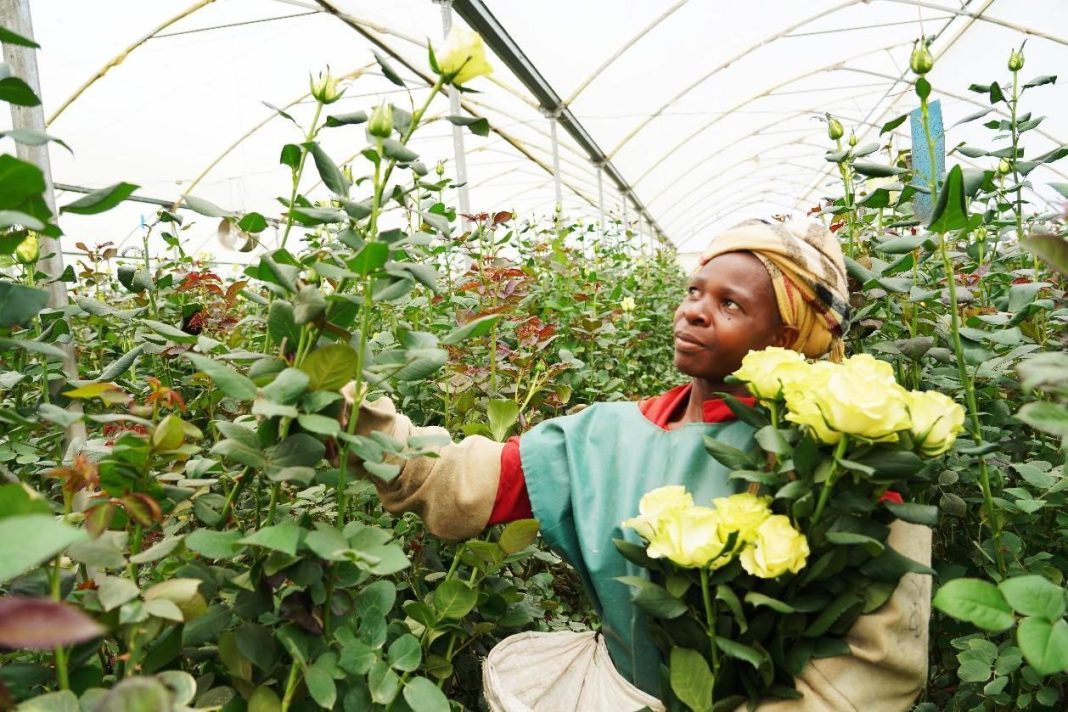BEIJING (BRNN): In the early morning at a flower farm in Kenya, freshly harvested roses, with dewdrops clinging to their petals, were ready to be shipped. In 48 hours, they would be put onto the shelves of the Hunan Gaoqiao Grand Market, Changsha, capital of central China’s Hunan Province half a world away.
At the Eighth Ministerial Conference of the Forum on China-Africa Cooperation in November last year, China announced the establishment of a “green channel” for African countries’ agricultural products entering China.
According to Clement Tulezi, CEO of the Kenya Flower Council (KFC), the “green channel” has helped shorten the time for inspection and quarantine and expand the exemption from customs duty, creating more market opportunities for Kenyan flowers and featured farm produce from other African countries, such as avocado, citrus and pineapple.
In recent years, African products have become increasingly popular in the Chinese market following the implementation of trade facilitation measures between China and Africa. Essential oil from Madagascar, gems from Zambia, coffee from Ethiopia, wood sculptures from Zimbabwe, wine from South Africa and cosmetics from Senegal are sought after by Chinese consumers.
Under the framework of the Forum on China-Africa Cooperation (FOCAC), China-Africa economic and trade cooperation has maintained strong vitality and achieved fruitful outcomes.
China has remained Africa’s largest trading partner for 15 consecutive years. According to statistics released by China’s Ministry of Commerce, China-Africa trade reached a record high of $282.1 billion in 2023, up 1.5 percent year on year.
Apart from the record-breaking trade volume, the China-Africa trade structure has also improved, highlighted by China’s surging agricultural imports from Africa. Last year, China’s imports of African nuts, vegetables, flowers and fruits increased by 130 percent, 32 percent, 14 percent and 7 percent, respectively, compared to the previous year.
Besides, mechanical and electronic products have maintained a major force in China’s exports to Africa. The rapid growth in China’s exports of the three major tech-intensive green products, namely the “new three” – new energy vehicles, lithium-ion batteries, and photovoltaic products, has offered strong support for Africa’s green energy transition.
What sustains the vitality of China-Africa trade?
The high complementarity between Chinese and African economies has laid a solid foundation for trade and economic cooperation.
Such complementarity is manifested in a wide range of areas including industrial cooperation, technical assistance, market potential and human resource collaboration, be it in agriculture, infrastructure, manufacturing or service sectors.
While working to synergize development strategies, China and Africa have constantly unleashed their development requirements, providing stronger momentum for economic and trade cooperation. While Africa’s high-quality agricultural products and rich minerals reach the Chinese market, China is bringing to the African continent new technologies and business models in trade logistics, digital economy, clean energy, health, green development and finance.
The continuous efforts to promote trade facilitation between China and Africa are injecting momentum into trade and economic cooperation.
With the official establishment of the African Continental Free Trade Area, enhancing trade cooperation with China has become a consensus of African countries. Meanwhile, China is working to expand the channels for African products entering the Chinese market.
As of June 2023, 16 types of agricultural products from 11 African countries have accessed China through the “green channel,” and 21 African countries have benefited from China’s elimination of tariffs on 98 percent of their taxable products.
Apart from globally oriented exhibitions such as the China International Import Expo and the China International Consumer Products Expo, China has specifically built platforms for African countries including the China-Africa Economic and Trade Expo, to enhance the market reputation of African products.
Trade development relies on well-developed transport infrastructure. In recent years, China and Africa have witnessed remarkable achievements in their infrastructure cooperation, which have significantly boosted trade facilitation between the two sides.
So far, Chinese companies have built and upgraded more than 10,000 kilometers of railways, nearly 100,000 kilometers of highways, nearly 1,000 bridges, roughly 100 ports, and a large number of hospitals and schools in Africa. A number of signature projects and “small yet smart” livelihood programs have been launched by Chinese companies in Africa’s transport, energy, power, housing and livelihood sectors.
The continuously improving regional connectivity in Africa has greatly boosted the continent’s economic development and propelled China-Africa economic and trade cooperation.
China and Africa are constantly expanding their areas of cooperation, from traditional trade and engineering projects to emerging sectors such as digital economy, green development, aerospace and finance.
Thanks to a branding program launched by China, chili pepper and other exports to China from Rwanda have enjoyed brand incubation and customized packaging services, thus embracing a high-end development path. In Kenya, a high-yielding maize variety bred with Chinese technologies in a demonstration field reported a yield 50 percent higher than that in surrounding area. Besides, China has signed civil air transport agreements with 27 African countries, and built and launched communication and meteorological satellites for countries including Algeria and Nigeria.
The emerging areas, business forms and models have led to wide-ranging, multi-level and high-quality China-Africa cooperation. China has always been at the forefront of international cooperation with Africa.
The unimpeded China-Africa trade will create more new opportunities for African countries’ economic and social development, contributing to the building of a China-Africa community with a shared future in the new era.






